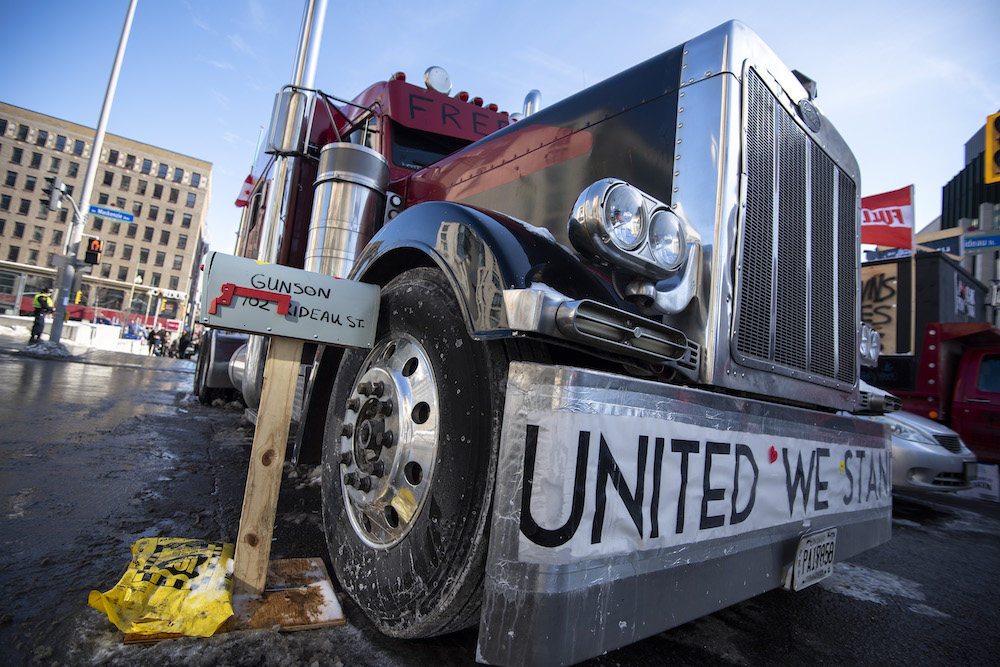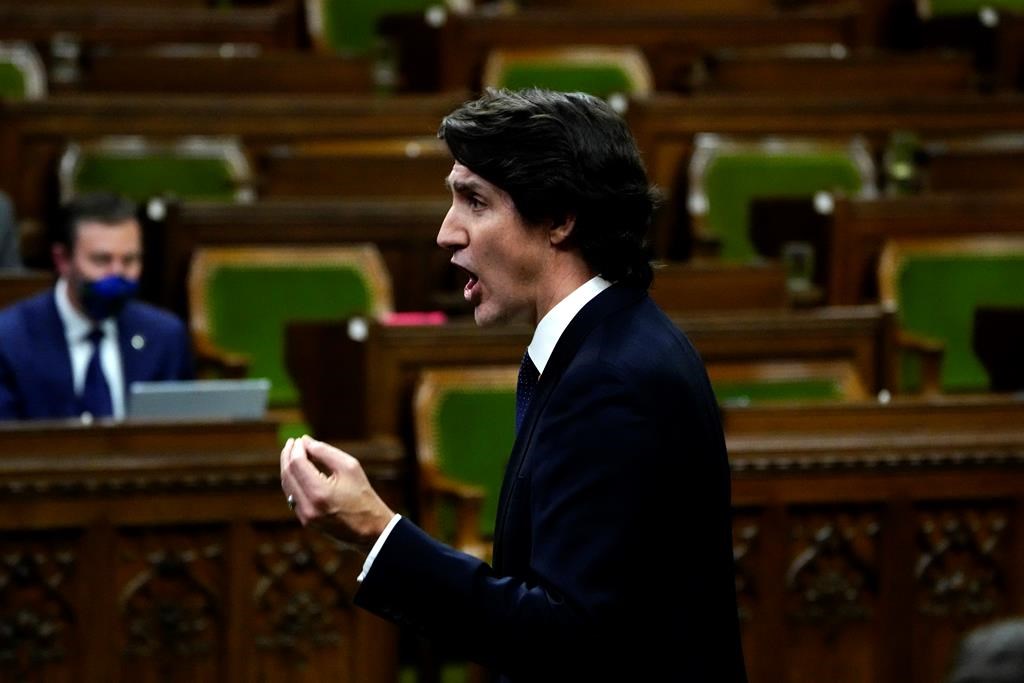First Bite Treats has been through a lot in the six months since it first opened in Ottawa’s ByWard Market.

Starting this year with a COVID-19 lockdown was “really disheartening,” says owner Abdallah Jama. He was hoping to turn things around in February with the reopening. Then the so-called “Freedom Convoy” descended on Parliament Hill.
“Business has been, to be frank, pretty tough,” Jama tells Global News. His shop is made for foot traffic with Instagrammable touches including a giant pink wall of flowers with a fluorescent sign that reads “Love at first bite” to complement his “croffle” creation — a cross between a croissant and a waffle.
As a small business owner, he says he can’t afford to shut down, even though his store, located on Sussex Drive, is a stone’s throw from the bulk of the disruption on Parliament. He goes into the store seven days a week, but sees reduced traffic and difficulties sending out delivery orders because he says drivers with Uber Eats and Skip the Dishes don’t want to get stuck in convoy-related traffic.
Often, the customers who come in are not wearing masks, which results in “some back and forth,” Jama says. It’s just another hassle that this business owner has been dealing with for now 12 days in a row.
Jama and business owners like him in Ottawa are collateral damage as the protest stretches into a second week. The city says security costs alone could soar to millions of dollars a day, and observers say the ripple effect on tourism and local business adds to the economic toll.
The City of Ottawa tells Global News that so far daily policing costs are around $800,000. On top of that is an additional $1 million in city services. Ottawa Mayor Jim Watson on Monday requested additional help from the federal and Ontario governments for an extra 1,800 agents which, if granted, would push daily policing costs to $2.5 million.
For context, safety and security costs for policing Canada Day celebrations in Ottawa have, on average, been $620,000 per year over the past decade. Trucker convoy costs have already eclipsed that.
Impact on tourism, hospitality and retail
Some local businesses and attractions have decided to close their doors amid the protests.

Get weekly money news
The Rideau Centre, a popular attraction downtown, has been closed since Sunday. In an email, a representative for Rideau Centre owner Cadillac Fairview directed Global News to a statement that says the decision to close was made because “authorities cannot provide any assurances that it is safe to reopen or that the police service would be able to assist our security personnel in maintaining public order and safety.”
This decision impacts thousands of employees and 175 businesses within the mall, which is the largest in the nation’s capital.
“The continued closure of an important community space, the loss of employment income, and the financial impact on our clients is heart-breaking given all of our shared pain and sacrifice during the pandemic,” Cadillac Fairview says.
David Soberman, a marketing professor at the Rotman School of Management at the University of Toronto, estimates the cost borne by businesses in Ottawa alone could total “several hundreds of thousands of dollars” in lost revenue so far.
Small business owners are fundraising to help Ottawa restauranteurs manage “the whiplash of sudden closures, staffing issues and supply chain challenges” as they “decide between making ends meet, and keeping their staff safe as the occupation of the downtown core enters a second week.” The GoFundMe campaign had raised nearly $60,000 at the time of publication, with a goal of $250,000.
This time of year is traditionally bolstered by tourists to the annual Winterlude festival, which last month cancelled in-person events for 2022 due to “COVID-19 concerns.”
With no clear indication of when the disruption on Parliament Hill and surrounding areas could be resolved, Concordia University economics professor Moshe Lander says the devastation to the “already battered” tourism and hospitality sector could be felt for many months.
“Even if they leave next week, could they be back in a month? Could they come disrupt long weekends?”
Lander tells Global News people may deem a capital under siege too risky to visit, which deepens the economic impact.
“It’s a much, much larger number than whatever the back of the envelope calculations are. You multiply it by a factor of 10 or 20 to get a real feel for what the long-term effects are,” Lander says.
Border disruptions
Protests temporarily closed the Ambassador Bridge between Windsor, Ont., and Detroit this week though crossings have resumed in at least one direction, with delays. It’s the busiest land connection for Canada-U.S. trade.
According to Dalhousie University researcher Sylvain Charlebois, 45 per cent of all agri-food imports to Ontario come across the Ambassador Bridge.
Charlebois tells Global News it’s too soon to assess exactly how much retail food prices will be driven higher. But he expects costs to be impacted “on both sides of the border.”
Alberta towns on the U.S. border are another target for convoy supporters. RCMP are at two sites, one in Coutts, Alta., and one just north of the city.
When asked about the policing tab, an RCMP spokesperson told Global News in an email “that isn’t information that we would have available at this time, particularly with resources from more than one division involved.” A total will be made available “at a later date.”
Although the flow of goods across the border with the U.S. has resumed, with delays, it was previously shut down for five days at the Alberta border, starting Jan. 29.
Soberman says the “ripple effect” of delays and backlogs, on top of current supply chain snarls, will ultimately cost consumers more the longer this drags on, exacerbating inflation already soaring at a rate not seen in three decades.
Protests in Toronto
A protest in Toronto, targeting Ontario’s legislature at Queen’s Park over the weekend and affecting a nearby hospital network, which is Canada’s largest, didn’t cause as many disruptions and seemed to end after two days of protests and counter-protests.
Soberman says Toronto Police and politicians, “learned from what happened in Ottawa” and made proactive moves so protesters couldn’t park vehicles and obstruct main thoroughfares.
“They realized that if the actual convoys get set up, it’s much more difficult to move them,” he says.
Although the city of Toronto and Toronto Police Service said they could not provide Global News with cost estimates, Soberman says they were significantly smaller than what Ottawa had to shell out.
Movement momentum
The Canadian Trucking Alliance has disavowed the convoy and the 90 per cent vaccination rate among truckers is comparable to the national average. But the movement, which began with a focus on the trucker’s vaccine mandate, has morphed into something much larger, and now includes all COVID-19 restrictions, from vaccines to masks.
It has attracted public support from political leaders including former U.S. president Donald Trump as well as Tesla CEO Elon Musk. Despite GoFundMe’s decision to freeze $9 million of the $10 million raised for the movement, Lander says its popularity should serve as a wake-up call to Canadians who perhaps thought divisive populist politics was exclusively an American phenomenon.
“We’re now kind of seeing a little bit of that underbelly that was appearing in American politics,” he says.
“This could be a major disruption if the government can’t find a way to bring this back under control and unite everybody politically, socially and economically.”










Comments